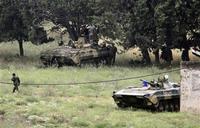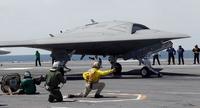-
UN inspectors' repot on gas attack points to Assad’s elite military units
Russia may say publicly that it does not know who launched the deadly 21 August gas attack on two Damascus neighborhoods, but the Russians must have had an inkling: Russia’s UN ambassador agreed to have an international team of weapon inspectors sent to Syria to investigate the 21 August attack on one condition: the inspectors’ mandate was narrowed to verifying that chemical weapons were used, but specifically prohibited the inspectors from assigning responsibility to the attack. Russia’s effort to shield Assad has resulted in a report, submitted Monday to the UN Security Council, which does not explicitly name the Syrian regime as the party launching the attack, but details buried in the report point directly at elite military formations loyal to Assad.
-
-
U.S. still has 3,100 tons of chemical weapons to be destroyed
Last weekend’s U.S.-Russia agreement on Syria’s chemical weapons has put on hold a U.S. strike on Syria. The pause may allow a reflection on the fact that the United States possesses one of the world’s largest chemical arsenals. Sixteen years after a treaty banning of chemical weapons went into effect, the Unites States has 3,100 tons stored in Colorado and Kentucky.
-
-
Experts question ambitious Syria chemical weapons agreement
The announcements in Geneva by Secretary of State John Kerry and Foreign Minister Sergey Lavrov were bold: President Bashar al-Assad has a week to provide detailed, accurate, and comprehensive information about Syria’s entire chemical weapons program: research labs, production facilities, test sites, chemical storage depots, and munitions kept by every military unit. Experts say that the tight timetable the agreement requires for disclosure of stockpile, destruction of production facilities, and the destruction of the chemical weapons themselves, would not only set a speed record, but that that it cannot be accomplished even with Syria’s full cooperation.
-
-
Syria’s chemical program, inventory
The Syrian chemical weapons program began in the 1970s when the Hafez al-Assad regime purchased chemical munitions from the Soviet Union. In the 1980s, Syria launched a broad program of acquiring the materials, products, and knowledge necessary to set up an autonomous chemical weapons production capacity. In the nearly four decades of acquisition, research, development, and production, Syria has amassed what experts consider to be the world’s largest chemical weapons stockpile, consisting of about 1,000 tons of chemical agents and precursor chemicals.
-
-
UN inspectors’ report points strongly to Syrian government’s culpability in 8/21 chemical attack
UN chemical weapons inspectors will on Monday submit their report to UN secretary general Ban Ki-Moon, in which they will say that they have collected a “wealth” of evidence which points to the Syrian government as being responsible for using chemical weapons against its own people.
-
-
Syrian conflict renews focus on chemical weapons
Chemical weapons have been used several times in modern history, with Germany recognized as the first country to use such weapons on a mass scale in the 22 April 1915 attack on 6,000 British and French troops at Ypres, Belgium. Since the 1925 Geneva Protocol, which banned the use of chemical and biological weapons, chemical weapons have been used in five conflicts, with Syria being the sixth.
-
-
Disarming Syria of chemical weapons exceedingly difficult, lengthy, uncertain process: experts
The Russian proposal concerning Syria’s chemical weapons is attractive: international inspectors will make a detailed account of Syria’s vast chemical stocks and take control of them; the weapons will be destroyed; and Syria will join the Chemical Weapons Convention. Experts say, however, that it may well be a deceiving attraction because it will be exceedingly difficult to implement and reliably monitor. “After more than 20 years in Iraq, the job still isn’t finished. Syria could be worse,” one expert says.
-
-
Chemical munitions used in 8/21 attack carried larger payload than previously estimated

A new study of the 21 August chemical attack on rebel-controlled areas on the outskirts Damascus found that that the rockets used in the attack carried larger toxic payloads than had previously been estimated. Weapons experts say that the fact that the rockets carried up to fifty times more sarin nerve agent than previously thought helps explain why there were so many more victims than in previous chemical attacks by regime forces.
-
-
Obama: Russia’s chemical weapons proposal may be a “significant breakthrough”
President Obama on Monday described a Russian proposal for Syria to turn over control of its chemical weapons to international monitors in order to avoid a military strike a “potentially positive development,” which could represent a “significant breakthrough.” Obama said, though, that the proposal should be taken “with a grain of salt,” and it was viewed with some skepticism by the administration, with senior officials saying the proposal could possibly be a delaying tactic aimed to undermine Obama’s already tenuous efforts to push for a military strike. The Russian proposal called for Syria to open its chemical weapons stocks to international inspections and give complete account of its stocks; begin the process of supervised destruction of these weapons; and join the Chemical Weapons Convention.
-
-
New detectors for chemical, biological threats

In the late 1990s, Sandia scientists developed a simple-to-use handheld chemical detector for the military, the MicroChemLab. Ever since, Sandia has improved such microfluidics- and microelectromechanical (MEMS) systems-based instruments that identify chemicals based on gas chromatography, or GC, and resonator-style instruments such as surface acoustic wave (SAW) detectors. The lab’s researchers are building on this sensor work to invent tiny detectors that can sniff out everything from explosives and biotoxins to smuggled humans.
-
-
Administration's Syria plan: limited operation with “downstream” effect
Three leading administration officials yesterday presented, in general detail, the plan of attack on Syria. The plan emphasizes the destruction of delivery vehicles – missiles, rockets, planes and their airfields, and artillery pieces – used in the delivery of chemical weapons. The three officials – Kerry, Hagel, and Dempsey — agreed that such an attack, even if its purpose would be to degrade the regime’s ability to deliver chemical weapons, would have “downstream” effect: these delivery vehicles also deliver conventional munitions, so their destruction would more generally degrade the regime’s ability to fight, thus making the battlefield between the regime and the rebels more level. The Senate Foreign Relations Committee is today drafting a new resolution which would permit up to ninety days of military action against the Syrian government and bar the deployment of U.S. combat troops in Syria but permit the deployment of a small rescue mission in the event of an emergency. The White House also would be required within thirty days of enactment of the resolution to send lawmakers a plan for a diplomatic solution to end the violence in Syria.
-
-
British MPs vote against U.K. military participation in attack on Syria
In a heavy defeat to Prime Minister David Cameron, , the British Parliament voted against British military contribution to or involvement in an attack on Syria in response to the Assad regime’s use of chemical weapons last week. The vote is an embarrassing defeat for Cameron, and a major set-back for President Obama’s plan to put together a coalition of the willing to strike military targets in Syria. The parliamentary vote has no military significance, as the British contribution to the actual military operations would have been minimal at best. The U.K. vote, rather, is a political blow to the United States as it highlights on-going skepticism among Western publics – including U.S. public opinion — about yet another Western military involvement in the Middle East.
-
-
UN withdraws inspectors from Syria ahead of schedule
UN secretary-general Ban Ki-moon has instructed the UN weapons inspectors investigating last Wednesday’s chemical weapons attack to leave Syria by Saturday. The withdrawal of UN inspectors in the face of an imminent military campaign is reminiscent of other instances of early departures of UN weapons inspectors from Iraq in December 1998. The Clinton administration tipped the inspectors off that missile strikes against Saddam Hussein’s regime were imminent.
-
-
Divisions in U.K. over Syria action
A U.S.-led attack on Syrian targets in response to the Syrian military’s use of chemical weapons in an attack on Sunni civilians last Wednesday may be delayed until next week in the face of strong opposition in the U.K. parliament to British involvement. Prime Minister David Cameron said MPs would be given a second vote to approve military action ahead of a Commons debate today (Thursday) on Syria, in order to defuse a parliamentary revolt. About seventy Tory MPs said they would join the Labor opposition in voting against the U.K. participating in the attack on Syria. Some of the opponents of U.K. participation say a UN approval of such an attack would be needed, while others say they want to see clear-cut proof of the Assad regime’s culpability.
-
-
U.S., allies prepare military strikes against Syria

Secretary of State John Kerry yesterday said that the use by the Assad regime of chemical weapons in attacks on civilians last Wednesday was undeniable. He said the Obama administration would hold the Syrian government accountable for this “cowardly crime” and “moral obscenity.” U.S. political and military leaders have been holding around-the-clock discussions with allies about a coordinated military attack on Syrian regime facilities. The United States, the United Kingdom, France, and Turkey said there was no need to seek a UN Security Council approval of military action against Syria, and that none will be sought. Administration lawyers have been crafting legal justifications for an intervention without UN approval that could be based on findings that Assad used chemical weapons and created a major humanitarian crisis. The U.S. Navy has moved more ships to the eastern Mediterranean, and activity has been stepped up in Britain’s air base in Cyprus.
-
- All
- Regional
- Water
- Biometrics
- Borders/Immig
- Business
- Cybersecurity
- Detection
- Disasters
- Government
- Infrastructure
- International
- Public health
- Public Safety
- Communication interoperabillity
- Emergency services
- Emergency medical services
- Fire
- First response
- IEDs
- Law Enforcement
- Law Enforcement Technology
- Military technology
- Nonlethal weapons
- Nuclear weapons
- Personal protection equipment
- Police
- Notification /alert systems
- Situational awareness
- Weapons systems
- Sci-Tech
- Sector Reports
- Surveillance
- Transportation
Advertising & Marketing: advertise@newswirepubs.com
Editorial: editor@newswirepubs.com
General: info@newswirepubs.com
2010-2011 © News Wire Publications, LLC News Wire Publications, LLC
220 Old Country Road | Suite 200 | Mineola | New York | 11501
Permissions and Policies
Editorial: editor@newswirepubs.com
General: info@newswirepubs.com
2010-2011 © News Wire Publications, LLC News Wire Publications, LLC
220 Old Country Road | Suite 200 | Mineola | New York | 11501
Permissions and Policies
